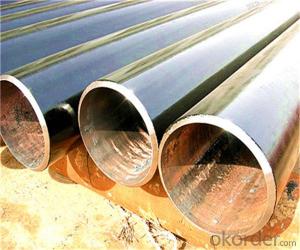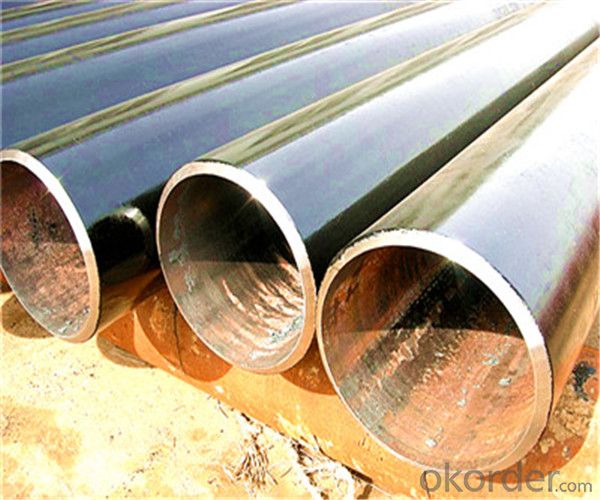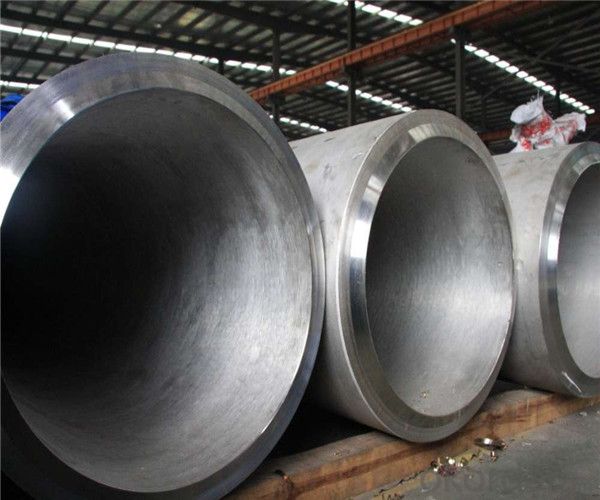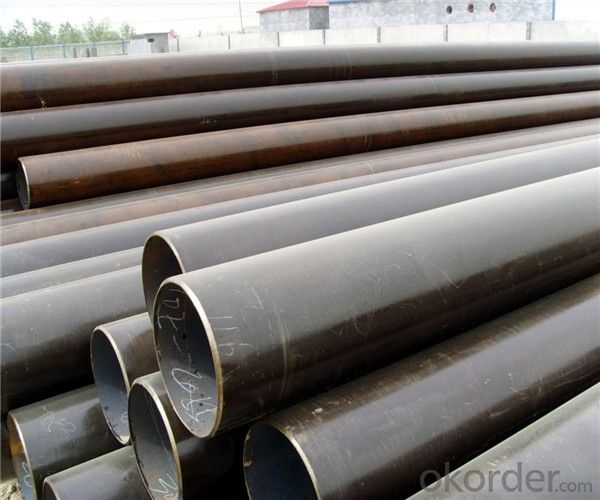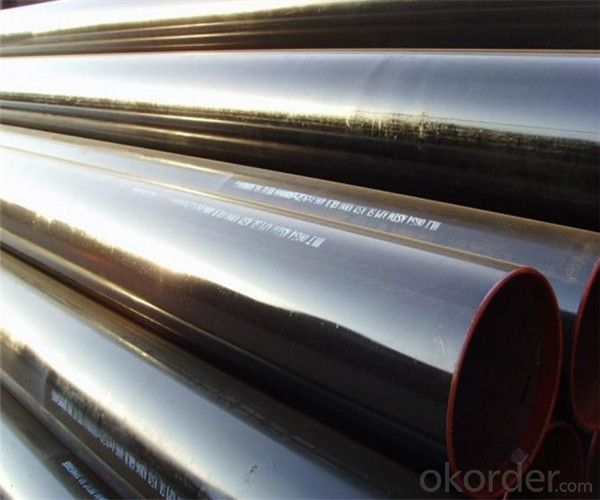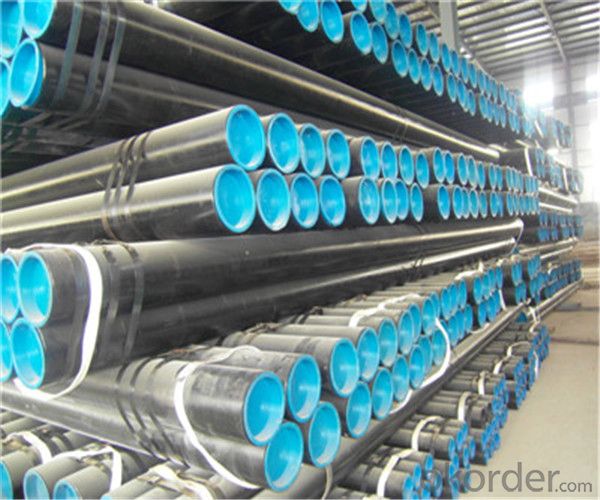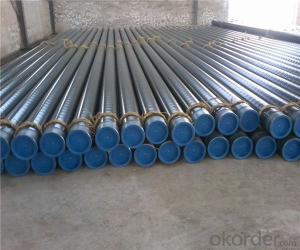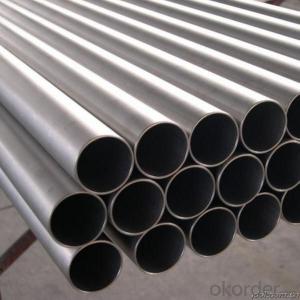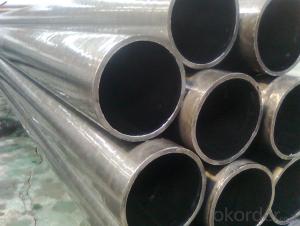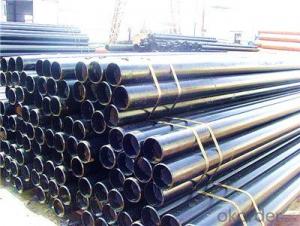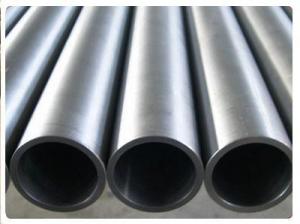Seamless Steel Pipe High Quality from Factory Price
- Loading Port:
- Tianjin
- Payment Terms:
- TT OR LC
- Min Order Qty:
- 50 m.t.
- Supply Capability:
- 3000000 m.t./month
OKorder Service Pledge
OKorder Financial Service
You Might Also Like
PRODUCT DETAILS
1.Structure of Seamless Steel Pipe Description:
A large amount of Seamless Steel Pipes is offered to the clients at cost effective rates. These pipes are extremely durable, resistant to corrosion and have high tensile strength. Our pipes are used in nuclear plants, power plants, refineries and construction industry across the country. Furthermore, we are capable of providing these seamless pipes to the clients in bulk quantity.
2.Packaging & Delivery:
| Packaging Details: | Seaworthy packages, bundles wrapped with strong steel strip |
| Delivery Detail: | 15-30 days after received 30% TT |
3.Main Features of the Steel Pipe:
• High manufacturing accuracy
• High strength
• Small inertia resistance
• Strong heat dissipation ability
• Good visual effect
•Reasonable price
4.Seamless Steel Pipe Specification:
| Standard: | GB, DIN, ASTM,ASME, ASTM A106-2006, ASTM A53-2007 |
| Grade: | 10#,20#, 45#, 16Mn |
Thickness: | 8 - 33 mm |
| Section Shape: | Round |
| Outer Diameter: | 133 - 219 mm |
| Place of Origin: | Shandong, China (Mainland) |
| Secondary Or Not: | Non-secondary |
| Application: | Hydraulic Pipe |
| Technique: | Cold Drawn |
| Certification: | API |
| Surface Treatment: | factory state or painted black |
| Special Pipe: | API Pipe |
| Alloy Or Not: | Non-alloy |
| Length: | 5-12M |
| Outer Diameter: | 21.3-610mm |
5.FAQ of Seamless steel pipe:
①How is the quality of your products?
Our products are manufactured strictly according to national and internaional standard, and we take a test
on every pipe before delivered out. If you want see our quality certifications and all kinds of testing report, please just ask us for it.
Guaranteed: If products’ quality don’t accord to discription as we give or the promise before you place order, we promise 100% refund.
②How about price?
Yes, we are factory and be able to give you lowest price below market one, and we have a policy that “ for saving time and absolutely honest business attitude, we quote as lowest as possible for any customer, and discount can be given according to quantity”,if you like bargain and factory price is not low enough as you think, just don’t waste your time.Please trust the quotation we would give you, it is professional one.
③Why should you chose us?
Chose happens because of quality, then price, We can give you both.Additionally, we can also offer professional products inquiry, products knowledge train(for agents), smooth goods delivery, exellent customer solution proposals.Our service formula: good quality+good price+good service=customer’s trust.
SGS test is available, customer inspection before shipping is welcome, third party inspection is no problem.
Any question, pls feel free to contact us !
- Q: Can steel pipes be used for chemical refineries?
- Chemical refineries can utilize steel pipes for their operations. Steel pipes are frequently employed in chemical refineries because of their exceptional strength, long-lasting nature, and resistance to corrosion. Given the harsh conditions present in a chemical refinery, including exposure to corrosive chemicals and extreme temperatures, it is necessary to employ materials that can endure such circumstances. Steel pipes possess the capability to withstand these challenges and are often preferred for their ability to securely and efficiently transport diverse fluids and gases. Furthermore, the weldability of steel pipes permits easy installation and maintenance within intricate refinery systems. All in all, steel pipes are a fitting choice for chemical refineries due to their durability, ability to resist corrosion, and compatibility with the demanding conditions encountered in this industry.
- Q: How to calculate the maximum bending stress of steel pipe? Is there a list of the maximum flexural normal stresses for steel pipes of different materials and diameters?
- Strength design of steel pipe by this formula to calculate the maximum normal stress in the steel pipe should be less than the value (based on your choice of different grades of steel, steel strength design value is not the same, this value can also be found through the design manual of steel structure), meet the requirements, it can meet the requirements of steel pipe under the action of bending moment strength.
- Q: What is the difference between steel pipe and copper pipe?
- The main difference between steel pipe and copper pipe lies in their composition and properties. Steel pipe is typically made from carbon steel, which is an alloy of iron and carbon. On the other hand, copper pipe is made from copper, a naturally occurring metal. One key difference is their durability. Steel pipe is known for its strength and resilience, making it suitable for high-pressure applications and harsh environments. It is highly resistant to corrosion, making it a long-lasting option. Copper pipe, on the other hand, is known for its malleability and ease of installation. It is less durable than steel and can corrode over time, especially when exposed to certain chemicals or aggressive water conditions. Another difference is their thermal conductivity. Copper pipe is an excellent conductor of heat, making it ideal for applications that require efficient heat transfer, such as in plumbing systems for hot water supply. Steel pipe, however, has a lower thermal conductivity compared to copper, which may affect its performance in certain applications. Cost is another factor to consider. Copper pipe is generally more expensive than steel pipe due to the higher cost of copper as a raw material. Additionally, copper pipe requires specialized tools and techniques for installation, which can add to the overall cost. Steel pipe, on the other hand, is often more cost-effective and easier to work with, making it a popular choice for a wide range of applications. In summary, the main differences between steel pipe and copper pipe are their composition, durability, thermal conductivity, and cost. Each type has its own advantages and disadvantages, and the choice between them depends on the specific requirements of the application at hand.
- Q: What are the different methods of threading steel pipes?
- There are several methods of threading steel pipes, including manual threading, machine threading, and dielectric threading. Manual threading involves using a manual pipe threader or a handheld die to create the threads on the pipe. Machine threading, on the other hand, utilizes power-driven machines that can thread multiple pipes simultaneously, increasing efficiency and accuracy. Dielectric threading is a specialized method that uses a high-frequency electrical current to generate threads on the pipe, which is commonly used for stainless steel pipes.
- Q: How are steel pipes used in the construction of irrigation systems?
- Steel pipes are commonly used in the construction of irrigation systems due to their durability and strength. They are used to transport water from the source to the fields or crops efficiently. Steel pipes can withstand high pressure and are resistant to corrosion, making them ideal for long-term use in irrigation systems. Additionally, their smooth interior surface allows for a smooth flow of water, ensuring efficient water distribution and minimizing the risk of clogs or blockages.
- Q: 20# seamless steel pipe and seamless steel pipe 20G what is the difference?
- 20#: low carbon steel seamless steel pipe, carbon steel is generally divided into low carbon steel, medium carbon steel and high carbon steel three, 45# steel in carbon steel, low carbon steel is lower than 45#, 45# is higher than that of high carbon steel, seamless steel pipe, such as no special requirements, using 20# seamless steel tube. 20# seamless steel pipe material is 20# steel, the strength is slightly higher than 15#, very little quenching, no temper brittleness. Cold plastic deformation and for bending, rolling, bending and hammer arch processing, arc welding and contact welding welding performance is good, when the thickness is small, prone to strict requirement of shape crack or complex shape parts. The cold or normalizing state of the cutting process is better than that of the annealed one. It is generally used to make workpieces with little stress and high toughness.
- Q: How are steel pipes used in the manufacturing of wind turbines?
- Steel pipes are used in the manufacturing of wind turbines primarily for constructing the tower, which provides structural support and stability to the turbine. These steel pipes are typically large in diameter to withstand the strong winds and carry the weight of the turbine components. Additionally, steel pipes are also utilized for the transmission of electrical cables within the turbine, ensuring efficient power generation.
- Q: What are the factors to consider when selecting the right steel pipe for a specific application?
- There are several factors to consider when choosing the appropriate steel pipe for a particular application. These factors encompass: 1. Compatibility with materials: Ensuring that the steel pipe is compatible with the substance it will transport or contain is crucial. Different materials may necessitate specific types of steel pipes to prevent corrosion or contamination. 2. Pressure and temperature requirements: The pressure and temperature conditions that the steel pipe will face should be taken into account. This will determine the necessary thickness and strength of the pipe to ensure it can withstand the intended operating conditions. 3. Size and dimensions: Selecting the size and dimensions of the steel pipe should be based on the flow rate, volume, and available installation space. It is vital to choose a pipe with the appropriate diameter and wall thickness to prevent flow restrictions or leaks. 4. Environmental conditions: The environment in which the steel pipe will be installed must be considered. Factors such as exposure to moisture, chemicals, or extreme temperatures may necessitate the use of specific coatings or materials to enhance the longevity and durability of the pipe. 5. Cost considerations: The cost of the steel pipe and its installation should be taken into account. Striking a balance between desired quality and available budget is essential to ensure the most cost-effective solution. 6. Regulatory compliance: Depending on the application, there may be specific industry regulations or standards that must be adhered to. Choosing a steel pipe that meets these requirements is important to ensure compliance and avoid any legal or safety issues. 7. Maintenance and lifespan: The maintenance requirements and expected lifespan of the steel pipe should also be considered. Some applications may require regular inspections or replacements, while others may require a more durable and long-lasting pipe. By carefully considering these factors, it is possible to select the appropriate steel pipe for a specific application that meets the desired performance, durability, and safety requirements.
- Q: Can steel pipes be used for paper mills?
- Yes, steel pipes can be used for paper mills. Steel pipes are often used in paper mills for various applications such as transporting water, steam, chemicals, and pulp. They are preferred for their durability, resistance to corrosion, and ability to handle high pressure and temperature conditions commonly found in paper mill operations.
- Q: Can steel pipes be used for water treatment plants?
- Yes, steel pipes can be used for water treatment plants. Steel pipes are widely used in water treatment plants due to their high durability, strength, and resistance to corrosion. They can effectively handle the high pressure and flow requirements of water treatment processes. Additionally, steel pipes can be easily welded and joined, making them suitable for various applications within water treatment plants, such as transporting raw water, treating chemicals, and distributing treated water.
Send your message to us
Seamless Steel Pipe High Quality from Factory Price
- Loading Port:
- Tianjin
- Payment Terms:
- TT OR LC
- Min Order Qty:
- 50 m.t.
- Supply Capability:
- 3000000 m.t./month
OKorder Service Pledge
OKorder Financial Service
Similar products
Hot products
Hot Searches
Related keywords
